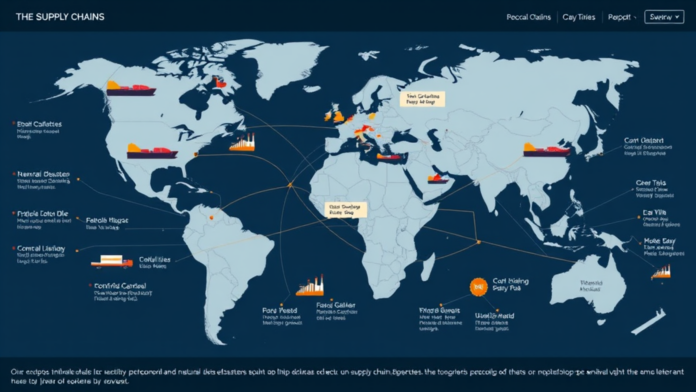Introduction to Global Supply Chain Disruptions
Definition and Overview
Global supply chain disruptions refer to significant interruptions in the flow of goods and services across international borders. These disruptions can stem from various factors, including natural disasters, geopolitical tensions, and pandemics. Such events can lead to delays, increased costs, and inventory shortages. Businesses must understand these dynamics to navigate the complexities of global trade effectively.
He must consider the following impacts:
These factors can severely affect profitability. The ripple effect can extend beyond immediate suppliers to entire industries. It is crucial for businesses to develop robust contingency plans. Preparedness is key.
Historical Context and Recent Events
Historically, global supply chains have evolved significantly, driven by advancements in technology and globalization. These developments have enabled businesses to source materials and products from various regions, optimizing costs and efficiency. However, recent events have highlighted vulnerabilities within these systems. For instance, the COVID-19 pandemic disrupted manufacturing and logistics worldwide. Many companies faced unprecedented challenges.
He must recognize key historical disruptions:
These eventc have reshaped supply chain strategies. Consequently, businesses are now prioritizing resilience and flexibility. Adaptation is essential in today’s market.
Causes of Supply Chain Disruptions
Natural Disasters and Pandemics
Natural disasters and pandemics are significant causes of supply chain disruptions, impacting production and distribution channels. These events can lead to factory shutdowns, transportation delays, and labor shortages. For instance, hurricanes can devastate infrastructure, while pandemics can restrict workforce availability. He must consider the financial implications of these disruptions.
Key factors include:
Such challenges necessitate strategic planning and risk management. Businesses must develop contingency plans to mitigate these risks. Preparedness is crucial for sustainability.
Geopolitical Tensions and Trade Policies
Geopolitical tensions and trade policies significantly contribute to supply chain disruptions, affecting global commerce. Tariffs, sanctions, and trade agreements can alter the flow of goods, leading to increased costs and delays. For example, escalating tensions betwixt countries may result in restricted access to essential materials . He must analyze the implications of theze changes on business operations.
Key considerations include:
These factors necessitate agile supply chain strategies. Businesses must remain vigilant and adaptable. Flexibility is vital for success.
Impacts on Businesses
Operational Challenges and Costs
Operational challenges and costs significantly impact businesses, particularly in the context of supply chain disruptions. Increased shipping delays can lead to higher inventory holding costs. This situation often forces companies to invest in expedited shipping options. He must evaluate the financial implications of these decisions.
Key impacts include:
These challenges can hinder overall business performance. Companies must adopt efficient management practices. Efficiency is essential for sustainability.
Effects on Inventory Management
Effects on inventory management are profound, particularly during supply chain disruptions. Businesses often face challenges in maintaining optimal stock levels. This situation can lead to either excess inventory or stockouts, both of which are costly. He must consider the financial ramifications of these inventory issues.
Key consequences include:
These factors can strain operational efficiency. Companies need to implement robust inventory management systems. Precision is crucial for success.
Strategies for Mitigating Risks
Diversification of Suppliers
Diversification of suppliers is a critical strategy for mitigating risks in supply chain management. By sourcing materials from multiple suppliers, businesses can reduce dependency on a single source. This approach enhances resilience against disruptions caused by geopolitical tensions or natural disasters. He must evaluate the benefits of a diversified supplier base.
Key strategies include:
These actions can improve supply chain stability. Companies should prioritize flexibility in sourcing. Adaptability is essential for long-term success.
Investment in Technology and Automation
Investment in technology and automation is essential for mitigating risks in supply chain management. By adopting advanced systems, businesses can enhance efficiency and reduce human error. Automation streamlines processes, allowing for quicker response times during disruptions. He must recognize the importance of these technological advancements.
Key benefits include:
These factors contribute to overall operational resilience. Companies should prioritize technology integration. Efficiency is key to success.
Future Outlook and Trends
Emerging Supply Chain Models
Emerging supply chain models are reshaping the landscape of global commerce. These models emphasize flexibility, sustainability, and technology integration. For instance, the circular supply chain focuses on resource efficiency and waste reduction. He must consider how these trends impact operational strategies.
Key trends include:
These changes can enhance responsiveness to market demands. Companies should adapt to these evolving models. Adaptation is crucial for competitiveness.
Role of Sustainability in Supply Chains
The role of sustainability in supply chains is increasingly vital as businesses face growing environmental concerns. Companies are now prioritizing eco-friendly practices to reduce their carbon footprint. This shift not only meets regulatory requirements but also enhances brand reputation. He must recognize the financial benefits of sustainable practices.
Key aspects include:
These strategies can lead to cost savings. Businesses should embrace sustainability as a core value. Responsibility is essential for future success.

